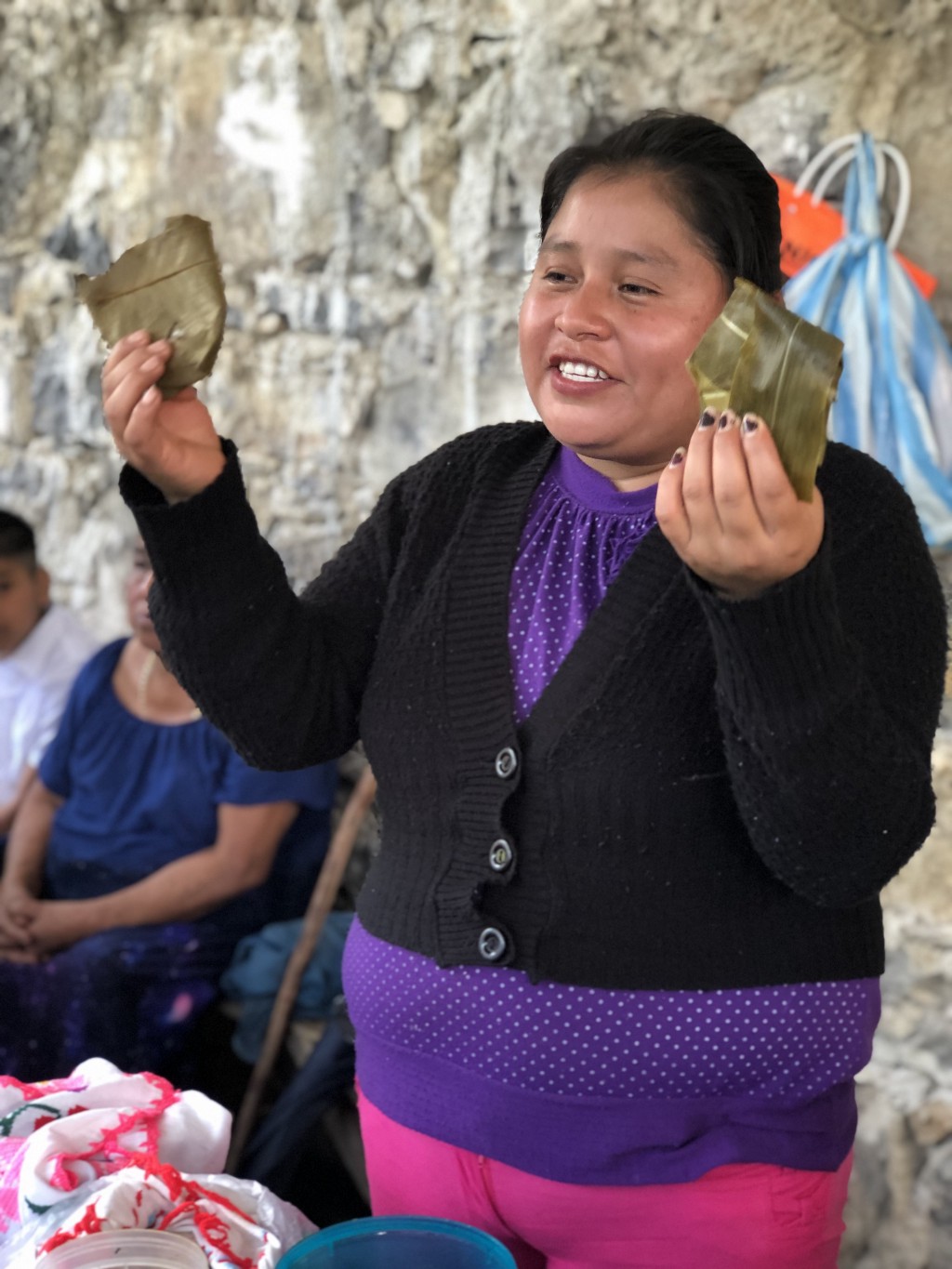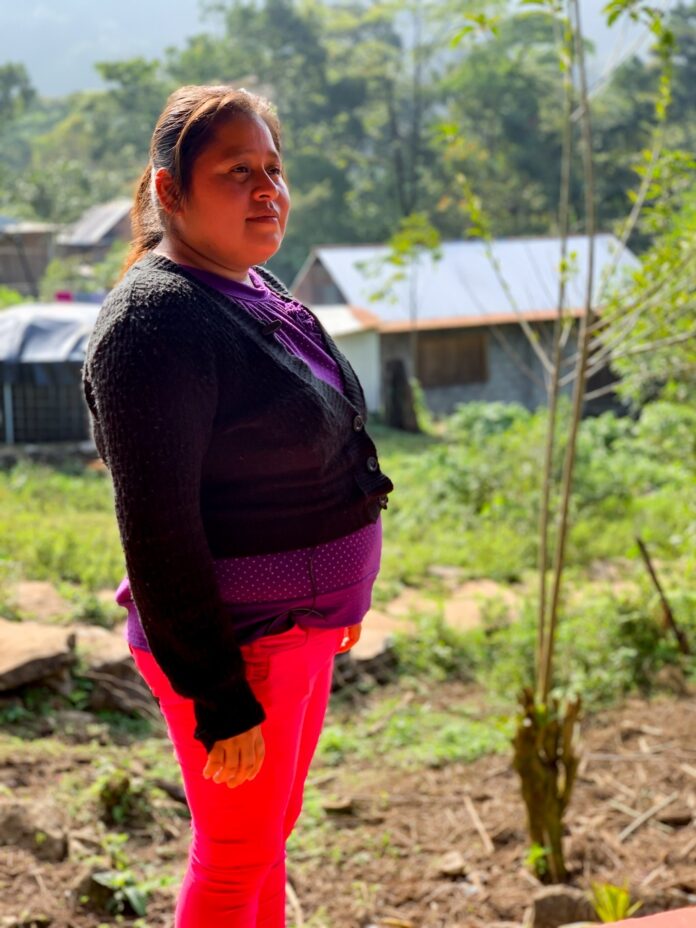Heroes of the COVID Crisis: How Liliana Martinez of The Hunger Project Stepped Up To Make A Difference During The Covid19 Pandemic
I would start a movement that invites people in the communities to challenge themselves to be different, to be transformative leaders in their own communities, to take the risk, to raise their voices — even more if you are an indigenous woman who has always been told to keep silent. I would start a movement that told my community to recognize your own power to transform your life and your community hand in hand with other people.
As part of my series about people who stepped up to make a difference during the COVID19 Pandemic, I had the pleasure of interviewing Liliana Martinez.
When the COVID-19 pandemic began in Mexico, Liliana Martinez quickly recognized that all of the critical information coming from the Mexican government and international organizations about the virus was written in Spanish, a language that many in her indigenous community do not speak. Working closely with The Hunger Project and UNFPA, Liliana helped create posters in her native language, Mazateca. Knowing how vital the information was and that many in her community could not read, Liliana also made audio recordings for her community to share on WhatsApp and other platforms to ensure the information could reach everyone. These recordings proved to be a vital resource for her community.
Thank you so much for doing this with us! Before we dig in, our readers would like to get to know you a bit. Can you tell us a bit about how and where you grew up?
I was born and raised in a small village called Cerro Alto in the Municipality of San José Tenango, in the State of Oaxaca in Mexico. I am the fourth daughter of Felicitas and Agustin. My dad migrated to find a job with more income, so my mom raised us. My studies finished with high school, because there were no schools nearby to continue my studies. I actually had to walk for 4 hours to get to my high school! After that, I married my husband German and now I am a mother of 4 children: 3 boys and 1 girl. I am a teacher of early education and I am on the community dining committee. I partner with THP-Mexico to promote eco-technologies and I lead the communications committee in my community.
Is there a particular book that made a significant impact on you? Can you share a story or explain why it resonated with you so much?
Paco el Chato, which is a book I use as a teacher of early education. It talks about the importance of being able to communicate with others and how communication is a valuable tool for small children, so they know how to use their voices in any context. Particularly knowing that there is a lot of migration to other states, it is important that children know who they are, and have the skills to speak with confidence.
Do you have a favorite “Life Lesson Quote”? Do you have a story about how that was relevant in your life or your work?
Everything is possible in life as long as there is hope. Hope has been very important for me and for our communities. We thought that we couldn’t change the conditions our community lives in, we thought that we couldn’t do things differently. When we created our vision [during a Vision, Commitment, Action Workshop], we were excited to imagine a new future for ourselves, but we weren’t completely sure that we would be able to fulfill it. However the hope was always there, hope to create a different future for ourselves and our children. Even though there have been difficult times, for example, all that has happened with the pandemic, we have never lost hope, and we truly believe that working together is the most important thing to fulfill the vision, not just for our community, but for other people in our Municipality. We have achieved a lot of things from our initial vision plan and we will continue working towards our community vision.
Ok, thank you for all that. Now let’s move to the main focus of our interview. You are currently leading a social impact organization that has stepped up during the COVID-19 Pandemic. Can you tell us a bit about what you and your organization are trying to address?
The first thing we wanted to address was that COVID-19 was real, that it was very serious and it was very important to be safe. We wanted to guide people, adults, youth, children, to take care of themselves and to follow hygiene recommendations. We wanted to share real information with the communities, from trusted sources.
In your opinion, what does it mean to be a hero?
For me, it is being a transformative leader in your community, supporting people without thinking of receiving something in return and not losing hope in any situation, even in the pandemic.
In your opinion or experience, what are “5 characteristics of a hero? Please share a story or example for each.
Help and serve people with humility.
Dedication.
Inspiration.
Raising your voice for your community, not looking only for your own benefit.
Supporting other people in their own process to build more heroines and heroes.
If heroism is rooted in doing something difficult, scary, or even self-sacrificing, what do you think drives some people — ordinary people — to become heroes?
It is taking risks and being able to do something different than what you are used to doing. It is breaking free from what they tell you you can be or do. For example, because I am a woman, I am only supposed to be at home, and I cannot handle other issues. [Heroism] is jumping in to do something different because you know what is required, and knowing that you are not going alone. That there are other transformative leaders who accompany the process and the more leaders there are, the more transformative are the actions that can be done.
What was the specific catalyst for you or your organization to take heroic action? At what point did you personally decide that heroic action needed to be taken?
Who are your heroes, or who do you see as heroes today?
For me, heroes are the people that decide to change, or to transform themselves to be their best possible version, not being scared of breaking stereotypes and being able to inspire others to also question themselves. Heroes are the ones that give unconditional support, who give confidence to others and motivate others to be different. Heroes are people who want to learn from others.
Let’s talk a bit about what is happening in the world today. What specifically frightened or frightens you most about the pandemic?
One of the things that scares me the most is to think that COVID-19 cases can increase in our communities and the risk this can represent because the hospitals are incredibly far away (at least 2 hours from where we live). Not only that, but the hospitals are still overwhelmed and our medical facilities do not have the necessary medicines and equipment to treat this disease.
Despite that, what gives you hope for the future? Can you explain?
What gives me hope is that in our communities we have been taking care of each other, we have followed the recommendations, we have the information and have shared it with others. What also gives me hope is that we continue to work together even if we are not seeing each other, we have created ways to stay in touch and be safe.

What has inspired you the most about the behavior of people during the pandemic, and what behaviors do you find most disappointing?
What has inspired me is the people [in my community] who have trusted the information we share with them. They are trusting us to translate health information and, as a result, they have followed important recommendations. Many families have taken great care and are not leaving their communities. They are also adapting recommendations to our context. For example instead of using antibacterial gel, we have used a local liquor. Behaviors that have disappointed me are people not following instructions. For example, not wearing masks or not taking care of themselves properly. Only when something really bad happens, for example, someone close dies, is when some people start making more conscious decisions.
Has this crisis caused you to reassess your view of the world or of society? We would love to hear what you mean.
Yes, for me it highlighted the importance of working together. At least in some places, people are looking for ways to help each other in creative ways — supporting local merchants, organizations, and sharing support between families. With THP, we say that people are creative and we work together to find ways to do things differently. However, at the same time, the crisis has also shown that not all people want to follow rules or want to see the common good.
What permanent societal changes would you like to see come out of this crisis?
I would like to see that people are more united, remembering that we are all connected and that the decisions we make affect others’ lives. I would also like our rural and indigenous communities to continue recovering more of our traditional knowledge and to be more respected for that knowledge. I would love to see more ways to share knowledge from different perspectives.
If you could tell other young people one thing about why they should consider making a positive impact on our environment or society, like you, what would you tell them?
I will want them to know that when we say that they are the future of our community, for example, it is not just something we want to say. From what they have seen and learned from older people, from the positive and negative things, they can create a vision of the future and start working to fulfill it right now. They are pillars of the communities, if they don’t enroll themselves, it could actually mean that some communities will disappear.
You are a person of great influence. If you could start a movement that would bring the most amount of good to the most amount of people, what would that be? You never know what your idea can trigger. 🙂
I would start a movement that invites people in the communities to challenge themselves to be different, to be transformative leaders in their own communities, to take the risk, to raise their voices — even more if you are an indigenous woman who has always been told to keep silent. I would start a movement that told my community to recognize your own power to transform your life and your community hand in hand with other people.
Is there a person in the world with whom you would like to have a private breakfast or lunch, and why? He or she might just see this, especially if we tag them. 🙂
I would love to meet some indigenous women leaders such as Tarcila Rivera [Country Director of THP-Peru] or [Guatemalan human rights activist] Rigoberta Menchu, so we could talk about ways of learning more among [indigenous women] and inviting more and more women to be transformative leaders.
How can our readers follow you online?
This was very meaningful, thank you so much. We wish you only continued success on your great work!
Heroes of the COVID Crisis: How Liliana Martinez of The Hunger Project Stepped Up To Make A… was originally published in Authority Magazine on Medium, where people are continuing the conversation by highlighting and responding to this story.


